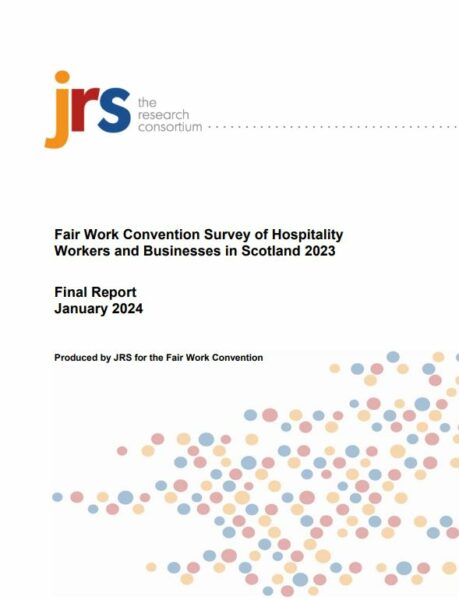The Fair Work Convention has today published findings from its surveys of hospitality workers and businesses in Scotland. This work provides vital evidence to the Convention’s ongoing inquiry into fair work in Scotland’s hospitality industry and will inform the inquiry’s recommendations for the Scottish Government and the hospitality industry to support better fair work outcomes.
The surveys were undertaken by the JRS Research Consortium and ran between May and June 2023. The research found a mixture of both positive and negative experiences for hospitality workers as well as both challenges and aspirations for hospitality businesses
Positive feedback was provided by over half of workers on key fair work areas. For example:
- 65% felt that they had received sufficient training to do their job well;
- 54% stated that pay was always stable and predictable;
- 56% were satisfied with their hours; and
- 54% were satisfied with their work/life balance.

However, these findings also suggest that for many, experiences of working in the hospitality sector are less positive. Many workers responding to the survey raised issues around the flexibility and predictability of hours, fairness in pay, relationships with managers, and insufficient training.
Bullying and harassment was a particular issue with 42% of workers surveyed personally experiencing bullying or harassment at work in the last 12 months, predominantly from customers (30%) but also from managers (22%).
Amongst these respondents, bullying or harassment most often related to their sex (36%), age (20%), accent (20%) or social class (17%).
Of those who either personally experienced or witnessed bullying or harassment at work, 42% had not reported it, most often due to a lack of anyone to report instances to, or an expectation that no action would be taken.
Despite this over half of workers surveyed (60%) would recommend their employer, and 45% would recommend the overall sector as a good place to work.
With increasing energy bills and supplier costs, nearly all businesses in the sector are experiencing significant cost pressures leaving limited reserves for investment in staffing. Of the businesses surveyed, almost three quarters (71%) are facing recruitment challenges and over half (53%) are experiencing high levels of turnover. Yet many businesses report that the main ‘knock-on’ impact of staffing shortages is existing staff having poor experiences, being required to work longer hours and being less likely to receive the training they need to develop. Given the pressures on staff it is unsurprising that almost half (47%) of businesses state that retaining skills within their business is difficult.
Challenges such as the high incidence of bullying and harassment as well as those requiring greater financial investment such as improving pay and providing more training, will require significant focus from employers across the sector to address.
The Fair Work Hospitality Inquiry will publish its recommendations later in the year. While it is undoubtedly a challenging time for hospitality businesses, there is still scope to make progress, and a focus on improving fair work would support better outcomes for workers and employers in the industry.
Survey of Hospitality Workers and Businesses in Scotland Report
